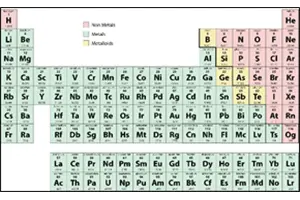
When it comes to maintaining strong, healthy bones, calcium supplements are a popular choice for many people. However, did you know that some calcium supplements may also contain a mineral called strontium? Understanding what strontium is and whether it’s beneficial or risky can help you make informed decisions about the supplements you may take.
Why is strontium added to some supplements?
Strontium is a naturally occurring mineral found in small amounts in sedimentary rock, soil, and groundwater. If you remember learning about the periodic table in school, you might recall that various elements are grouped together by their similar chemical behaviors. One such grouping includes calcium (Ca), strontium (Sr), and barium (Ba), which have chemical properties in common, and you can see them in the table shown above in the second column from the left. Because strontium is chemically similar to calcium, it can interact with the body’s bone-building processes and is sometimes added to bone health supplements.
There is a form of strontium called strontium ranelate, which was once available in the United States by prescription only for the treatment of osteoporosis, but production stopped in 2017 largely due to serious cardiac-related adverse effects. For the purpose of this blog, we will be discussing the form typically found in some supplements called strontium citrate.
What are the concerns?
The molecular weight of strontium is heavier than calcium. The strontium in the supplement gets absorbed into our bones, much like calcium does, but when a DXA scan is done, the results will not be an accurate representation. Here’s is how this is described by Mirza and colleagues (1):
“Much of the bone density increase being seen with SrC [strontium citrate] is likely due to the replacement of calcium with strontium in the bone. Strontium has a larger atomic weight than calcium (38 vs 20), which causes it to attenuate X-rays more strongly than calcium. Hence the readings on the DEXA scan appear artificially inflated with bone density looking better than is the case. Comparisons of Ca hydroxyapatite (natural bone crystal) and Sr hydroxyapatite (Sr-substituted bone crystal) have revealed that for every 1% of strontium incorporated into bone crystal, BMD [bone mineral density] is overestimated by 10%.”
Furthermore, while the estimated biological half-life of strontium citrate varies from person to person, it can be as long as 18 years. In summary, not only does the strontium result in an overestimation of our bone density, it also stays in the bones for a very long time.
A note about AlgaeCal
One well known company, AlgaeCal, strongly promotes strontium for bone building. Recently, possibly due to growing concerns related to the effectiveness and safety of this supplement, they have an entire section on their website dedicated to addressing the “myths” about what they call the misunderstood mineral. https://hcp.algaecal.com/strontium-the-misunderstood-mineral
They cite the following 3 studies to support their position, notably the same 3 studies that have been there for years:
1. Michalek JE, Preuss HG, Croft HA, et al. Changes in Total Body Bone Mineral Density Following a Common Bone Health Plan with Two Versions of a Unique Bone Health Supplement: A Comparative Effectiveness Research Study. Nutrition Journal 2011; 10, 32.
- not a randomized control trial; partly funded by Integrative Health Technologies, Inc. (a company with strong connections to AlgaeCal); one of the authors (GR Kaats) is on AlgaeCal’s advisory board
2.Kaats GR, Preuss HG, Croft HA, Keith SC, Keith PL. A Comparative Effectiveness Study of Bone Density Changes in Women Over 40 Following Three Bone Health Plans Containing Variations of the Same Novel Plant-sourced Calcium. International Journal of Medical Sciences 2011;8(3):180-191.
- not a double-blind, randomized controlled trial; 3 of the 5 authors were employed by Integrative Health Technologies at the time the study was published, (GR Kaats, SC Keith, PL Keith)
3. Kaats GR, Preuss HG, Stohs S, Perricone N. A 7-Year Longitudinal Trial of the Safety and Efficacy of a Vitamin/Mineral Enhanced Plant-Sourced Calcium Supplement. Journal of the American College of Nutrition 2016;35(2):91-99.
- not a randomized controlled trial; as revealed at the end of the study: “This study was funded by a grant from AlgaeCal Inc.”
Caution recommended:
Despite the claims, there is no high-quality research showing strontium citrate to be effective against osteoporosis. Low quality, company funded studies may show promising results, but these findings if true, must be validated with rigorously designed, double-blind, placebo-controlled trials with large populations to establish definitive efficacy and safety.
If you decide to take any form of strontium,make sure to tell your healthcare provider.
- Mirza FS, et al. Change in Bone Mineral Density with Strontium Citrate: An Illusion or Reality. Journal of Nutritional Health and Food Science 2016; 4(3): 1-3. (This is a case study that provides an excellent explanation of strontium citrate when used to promote bone health.)

